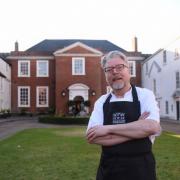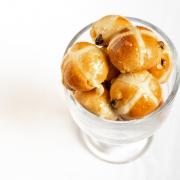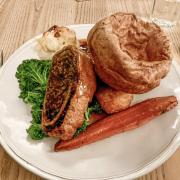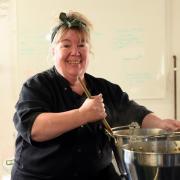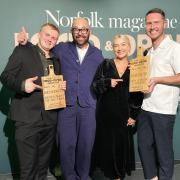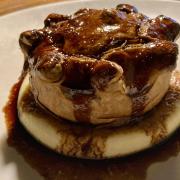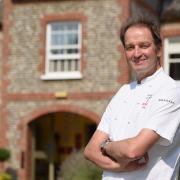There can't be many new companies whose business forecasts are as long term as those of Andrew Nelstrop. His spreadsheet for the Norfolk-based English Whisky Company includes business projections up to 2054.
That’s the spirit
There can’t be many new companies whose business forecasts are as long term as those of Andrew Nelstrop. His spreadsheet for the Norfolk-based English Whisky Company includes business projections up to 2054.
Pictures: Denise Bradley
It will be future generations who’ll reap the harvest sown by Andrew and his family four years ago when they decided to set up England’s first – and only – whisky distillery.
“It’s the equivalent of planting woodland on a farm,” says Andrew. “It’s an enormous commitment and it takes years to come to maturity.”Andrew’s family has been based at Roudham, near East Harling, for many years, with farming interests locally and internationally. His father, James, founder of The English Whisky Company, couldn’t understand why there were no whisky distilleries in England – Scotland and Ireland having cornered the market in the UK. “He’d been going on about it for years,” remembers Andrew. “And then we were all sitting at a family farm meeting in September 2005 and he mentioned it again. We just agreed there and then that we would have a go.”
Within a month plans for new buildings on the farm had been submitted and planning permission was granted in January 2006. Building work commenced and by November 2006 Andrew was ready to start distilling.“When my family decides to do something, we don’t hang about,” says Andrew, who has swapped his role as a farmer to become full time managing director of the distilling business.
Whisky distilling has a long and glorious history in both Ireland and Scotland but, up to this point, has not been carried out in England since the 18th century. It seemed obvious for the patron saint to give his name to the English Whisky Company and so the distillery was named St George’s Distillery, with the traditional scene of George and dragon gracing the company logo.
“There is no particular reason why there has not been an English distillery in modern times,” says Andrew. “But it was probably always going to be a private company like ourselves who would be mad enough to have a go.”The family has invested around �2m in the whisky distillery – the huge new buildings at Roudham are state of the art and were constructed from scratch on a greenfield site.
The company employs around 15 full and part time members of staff in the business, which now includes a shop and coffee shop. It’s also proving popular with whisky-loving visitors – between 35,000 and 50,000 tour the site each year.
“At the moment we are relying on the tourism side of the business to see us through,” he adds.
The location of the distillery in Breckland gives it access to the largest aquifer in East Anglia. The water is pure and clean, and can be abstracted at the perfect temperature for whisky distilling.
Locally grown malting barley is the other vital ingredient for the process of creating a good single malt whisky. The process of distilling the liquid, which results from combining barley and water, takes around five days. The resulting spirit has to be decanted into oak barrels where, by law, it must stay for three years before it can be legally classified as whisky. Andrew enlisted the help of noted distiller Iain Henderson, who had just retired from the Laphroaig distillery on the Isle of Islay in Scotland, famous for its single malt Scotch whisky.
“Iain’s contribution was hugely important for us,” explains Andrew. “We could have learned how to distil good whisky from scratch, but for a bunch of Norfolk farmers that could have taken months and months. With Iain helping us, we had years of experience and knowledge to draw on and he gave us the perfect start.”
Andrew says that the reaction of the established whisky distilling fraternity has been positive. “We’re no threat to anything that they do, because we are on such a small scale and we’re not competing to create a ‘scotch’ whisky, as we’re clearly not in Scotland.”
The English Whisky Company currently produces around 150,000 bottles of whisky a year with the aim of increasing this to 250,000 within 10 years. Because of the length of time a whisky takes to mature, it’s likely to be a further 10 years before the firm is selling a quarter of a million bottles annually.
Next month marks three years since the first distillation – pre-orders for bottles of true whisky have been selling well. And up to now, Andrew explains, they have been able to sell their liquor as “not yet whisky”, bottling it at different stages or “chapters”. So chapters one and two are the peated and plain spirits, chapters three and four are the 18-month old spirits and chapter five, just about to be launched is the full blown three-year-old whisky.
“We hope that over the years, collectors will look out for the different chapters from our distillery and amass them all,” says Andrew. Currently, they are selling their products well in Japan, Singapore, Holland, Belgium and France, and hopefully expanding to Germany and Canada later this year. The aim is to target the USA next. In this country, St George’s whisky sells either direct through the company website and shop, or via distributors.
To find out more visit www.englishwhisky.co.uk Andrew Nelstrop is a member of the Royal Norfolk Agricultural Association.
Whisky facts
• The name “whisky” comes from the Gaelic for “water of life”, “uisge beatha”, which to the English ear sounds like “uishgi”, or whisky.• To taste whisky drink it with a splash of water – no ice. Whisky releases its smell and taste at about 34pc alcohol and yet by law it must be at least 40pc. So dilution allows you to taste all its subtle flavours – adding ice simply deadens the scent and taste. To drink whisky, take it with whatever you prefer!• The English Whisky Company makes two types of whisky, peated and plain – the difference being in the way the barley is malted. It is soaked in hot water then dried – using either peat or wood as fuel for drying.• The oldest distillery in the world is the Old Bushmills distillery in Northern Ireland, which dates back 400 years and was granted a distilling licence by King James I.







